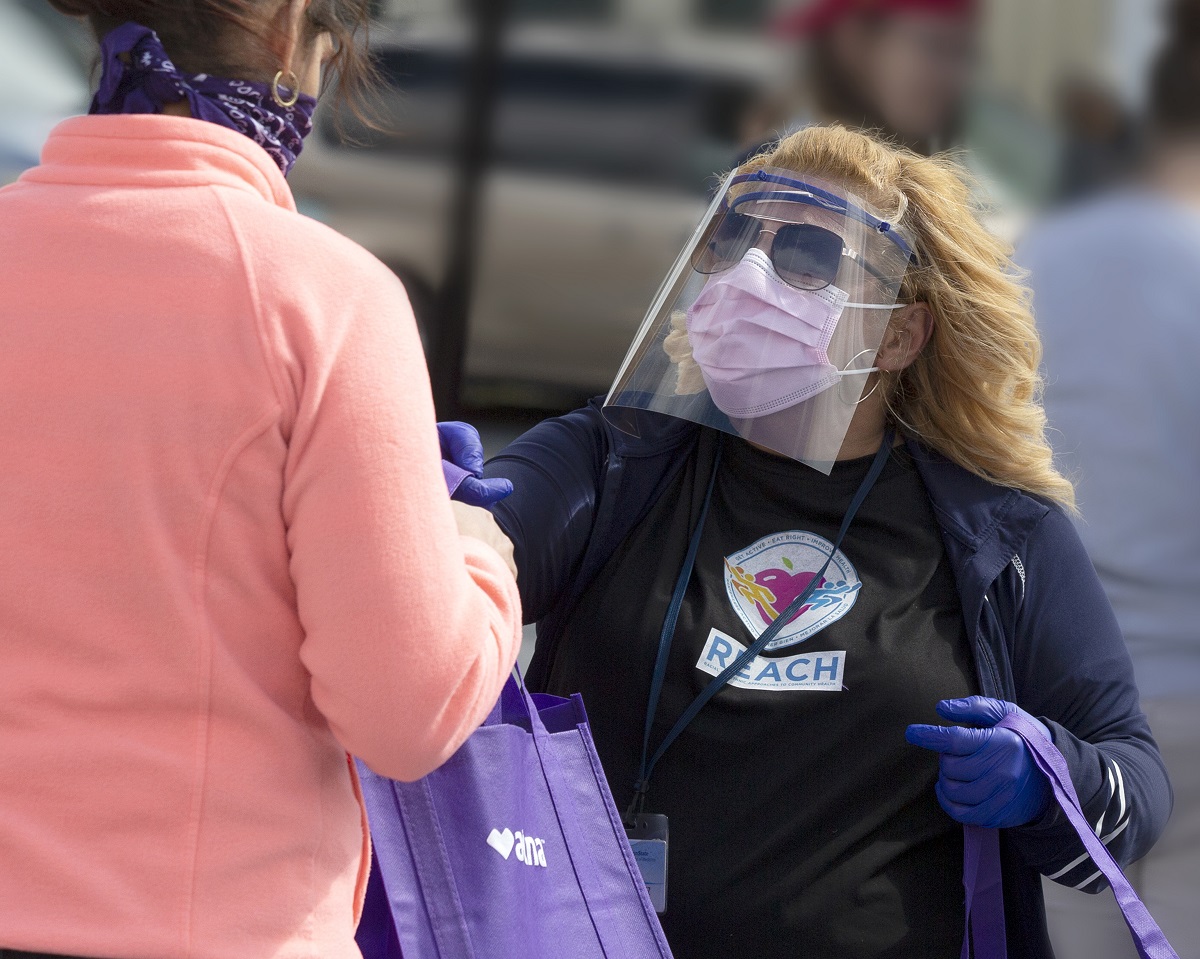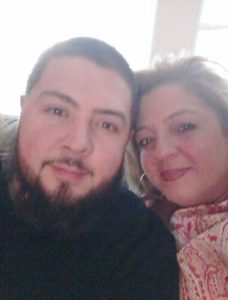Separado pero unido: REACH program helps Hispanics, Latinos at local level

One night, Madeline Bermudez’s cell phone rang. It was her son, Noel Vazquez, calling from his bedroom a few feet away.
Breathing, he said, had become nearly impossible.
She’d been dreading the call for weeks. She and her son, 33, had been living apart under the same roof since he’d come home from work with a cough. Bermudez, a community health worker at Penn State College of Medicine, did her best to nurse and comfort him through the closed door to his bedroom. Every day, she cooked his meals and left them in the hall. She washed the empties he left behind. She made him hot ginger tea, checked in often even through the night and had him monitor his own vitals.
A positive diagnosis for COVID-19 came on his 12th day in quarantine.
Bermudez works every day to save people from the nightmare she was living. As an agent for Penn State REACH, a Centers for Disease Control and Prevention (CDC)-funded program awarded to the College of Medicine, Bermudez and others like her every day hear horror stories from Hispanics and Latinos, among the communities most affected by the coronavirus. Spanish-speaking families, co-workers and friends in the U.S. are doing what comes naturally in a crisis – gathering, hugging one another and sharing dinner tables. In case after case, many don’t realize they’re signing their own death warrants because the form is often written in English.
In the war against COVID-19, community workers like Bermudez and Diana Rodriguez, her counterpart at Penn State Health St. Joseph, have become quartermasters, arming people with information. They are working around the clock in Lebanon and Berks counties to get information – in Spanish ― out to the people who need it.
For Bermudez, the battle has become personal.
The night Vazquez called her from his bedroom, he’d been vomiting for four days, and cold showers couldn’t budge the needle on his fever.
“I wasn’t prepared,” she said. Bermudez didn’t have any masks or gear to protect herself from his illness. If she and her husband developed COVID-19, what then?
She left a T-shirt by Vazquez’s bedroom door and told him to wrap his face in it. She wrapped another around her own face and drove him from their home in Lititz to a hospital in Lancaster.
At the door, masked health care workers took her son away. They didn’t permit her to come along.
“He doesn’t speak English too well,” she pleaded. “I’m a certified medical interpreter.”
They sent her home.
“I was so scared,” she said. Weeks later, the memory still catches in her throat.
Everything changed
Thousands of members of the community it has been her job to reach for the past two years aren’t as fortunate as Bermudez. Many are navigating the pandemic blind. Information about COVID-19 in Spanish is hard to come by. And social distancing for the Hispanic community is a tough ask – family and close contact go with the culture hand in glove, she says.
Penn State REACH is working to bridge gaps. The College of Medicine’s REACH program grew out of a partnership with a community coalition in Lebanon County geared to improve healthy food access and physical activity. In 2018, the College of Medicine received $4 million from the CDC to promote healthy lifestyles and reduce health disparities among Hispanics through stronger community-clinical linkages. It’s one of 31 REACH organizations nationwide.
Then came a global pandemic.
“COVID changed everything for our team,” said Dr. Jennifer Kraschnewski, an internal medicine physician at Hershey Medical Center who serves as the project’s principal investigator.
They discovered the need for the services they could provide had become much more dire. Hispanics and Latinos represent 66.5% of the population in Reading and 44% in Lebanon. Many don’t speak English.
Aside from information about how to prevent COVID-19, other questions needed Spanish-language answers. How do you get access to food if you can’t afford it? What if your landlord evicts you or the power company shuts off your electricity? And what if the offices and social programs you used to rely on for answers locked their doors to prevent the disease’s spread?
“A lot of these folks don’t have access to the internet,” said Andrea Murray, project manager and community engagement coordinator for Penn State REACH. “Trying to get information out has been toughest.”
Working from their homes, REACH workers created flyers containing information on the virus and social services. They worked with grocery stores and placed the flyers into bags and on bulletin boards. They called landlords and asked them to share information with their tenants.

Noel Vasquez and his mother, Madeline Bermudez.
The group hosted 15 Zoom meetings on its Facebook page, which reached 743 people. In April, Penn State Project ECHO (Extension for Community Healthcare Outcomes), a telementoring program that allows doctors to share information, hosted a Spanish-language session and opened it to the Hispanic community. Hundreds attended.
“It’s been amazing,” Murray said. “You can see we’re getting a huge reach.”
Hands on
The team also works with its various partner organizations to help ensure emergency food supplies are delivered because already-present food insecurities have become heightened during the pandemic.
“COVID-19 has exposed the cracks in the system,” Kraschnewski said. “And the cracks have really grown. It’s worsened the disparities.”
On occasion, the work is very hands-on. Murray and Bermudez have helped deliver food to schools for distribution.
David Saunders, director of health equity at the Pennsylvania Department of Health, asked Murray to join the COVID-19 Health Equity Response Team. The group meets weekly for an open discussion about responses to the COVID-19 pandemic in the context of health equity. Murray will share her firsthand knowledge from the pandemic’s front lines.
“We have the kind of team that does what needs to be done,” Kraschnewski said. “It’s so inspirational to see.”
Bermudez gives out her personal cell phone number and often gets phone calls well into the night. Sometimes the voice on the other end is someone she never met before but who wound up with her number as a way to get answers.
Earning trust
On May 11, Bermudez and Rodriguez worked REACH’s first face-to-face information, mask and hand-sanitizer distribution event since the crisis began.
A group of 20 or so volunteers donned personal protective equipment and gathered in the parking lot of the Covenant United Methodist Church in Lebanon. On tables, they arranged bags full of Spanish-language information along with hand sanitizer and surgical masks.
Using traffic cones, the group created two lanes – one for people who just wanted to pick up the bags and another for people with questions.
A family in an SUV, all wearing tattered surgical masks, pulled through the question line. “How do I know these masks I’m using are any good?” asked the man in the driver’s seat in Spanish. Bermudez told him to store each mask in its own paper bag. She gave the man one of the free sacks of information and equipment.
“We’re almost out of masks,” a volunteer said. Bermudez pulled out her cell phone and began a series of calls to track down more. Volunteers located another box moments later.
A deaf woman walked up to one of the tables, looking for more information about the virus. Bermudez knew enough sign language to point her in the right direction.
The job requires you to know at least a little about unexpected subjects. I have symptoms, how can I get tested? I lost my job, where can I go for help? How can I get groceries?
Often, the questions are off-the-wall. Is the virus all around us, constantly in the air? Will sealing my windows help?
Two years into the job, Bermudez studies each issue and does her best to answer questions with calm, rational advice.
“You have to earn their trust,” she said. “You have to be persistent and consistent.”
It’s hard for her to remember a time when she wasn’t a community medical worker. Being from Puerto Rico, her neighbors where she grew up in Lancaster used to rely on her English skills. Bermudez helped translate for neighbors and families at doctor appointments and in pharmacies when she was as young as 12.
In the U.S., she took a course and received a certification as a medical translator.
Never before, however, have her work and home life intersected so sharply.
When she came home from taking her son to the hospital that night, Bermudez scrubbed her car and every inch of her house with Clorox. She doused everything in disinfectant.
She considers herself lucky. She knew enough to protect herself and her husband, and never developed the illness that nearly killed her son, who recovered after 16 days.
How many haven’t had the same good fortune?
COVID-19 doesn’t know language, socioeconomic or racial barriers, Bermudez said. The only way to stop it is to be a little more like COVID-19 – reach beyond boundaries and include everyone.
“If we come together, we can combat this,” she said, “and we can be a better community.”
If you're having trouble accessing this content, or would like it in another format, please email Penn State Health Marketing & Communications.
